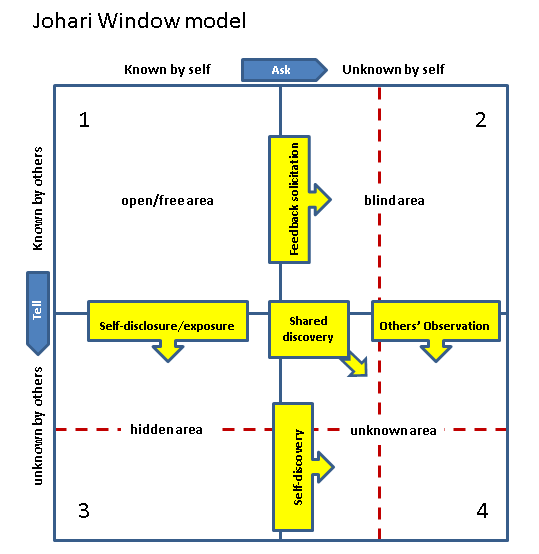This is the area that is not consciously known to ourselves or other people around us. It is displayed in the Bottom Right of the diagram. It can be thought to be an area of either great destruction or great creativity.

While it is not consciously known, it is usual that people (both self and others) sense it intuitively. We can reduce the size of this unknown part of ourselves by engaging in self-discovery, reflection, listening to others’ opinions without judging them, and, I believe anyway, by being curious about our emotional reaction to things.
If we do the opposite, that is, assume that our emotions are things that we can do nothing about, Pane 4 may increase in size. If we go through life reducing our self-disclosure and rejecting feedback) Pane 1 (PUBLIC) becomes smaller.
Distancing ourselves from our emotional state might lead to the banana skin, that is, the self-destructive accident. We do not know (nor does anyone else) why it happens but it happens! We might say we took our eye off the ball. It appears to be more likely to happen if we are narcissistic, and consider ourselves to be very important, and we get paranoid about power or fame slipping away.
There is also a body of thought that suggests that psychosomatic illnesses are linked to expansion of Pane 4. We may find honest feedback difficult to take and while we might always be complaining we find it hard to truly share difficulties that we have with a trusted other – or even acknowledge to ourselves that we have difficulties at all.
But by far the most interesting thing is that as Pane 4 is reduced (by courageously accepting feedback and taking the risk of self-disclosure) the amount of creativity seems to increase – things seems to go better, and better luck seems to come our way. [1]. Good things begin happening in our lives and as we increase resilience we develop resistance to knock-backs.
So we can consider Pane 4 to be a potential source of great personal creativity and other resources or potentials which we do not know that we have.
[1]. Much research into effectiveness of therapy points to factors outside the client or therapist as being important in respect of healing and returning to wellness. Is this due to us being more open and trusting, as well as becoming consciously aware of positive things in our lives that we previously ignored or deemed to be unimportant?
